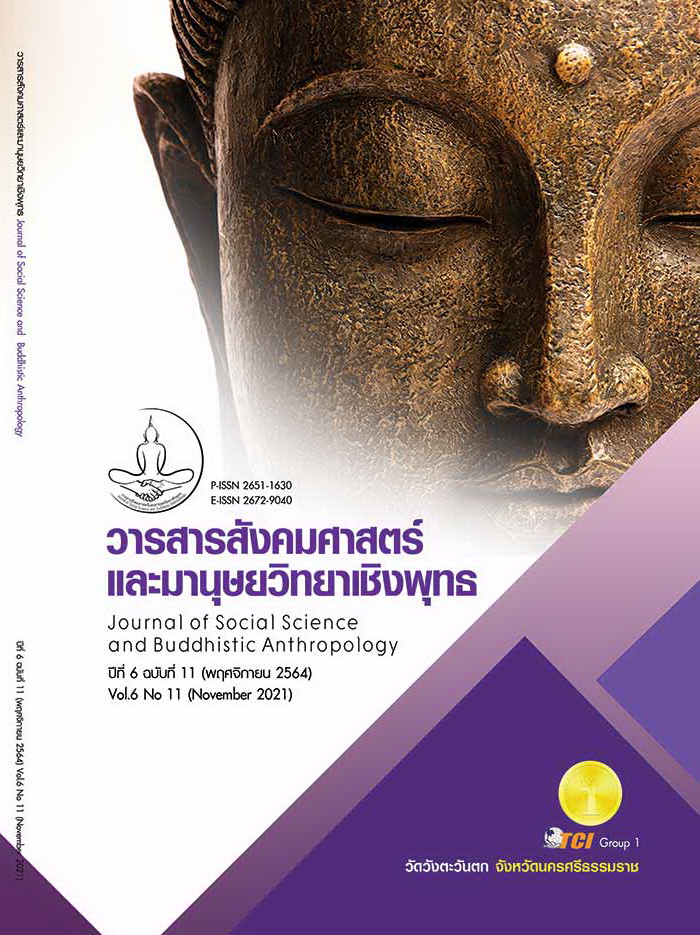HUMAN RESOURCE DEVELOPMENT STRATEGIES AND HUMAN RESOURCE MANAGEMENT THAT AFFECT ORGANIZATIONAL COMMITMENT TO CREATE COMPETITIVE ADVANTAGES
Keywords:
Human Resource Development, Human Resource Management, Organizational Commitment, Competitive AdvantageAbstract
The objectives of this research article were to: 1) to study the impacts of human resource development on organizational commitment, 2) to study how human resource development can, directly and indirectly, enhance the competitive advantage, 3) to study the impacts of human resource management on organizational commitment, 4) to study how human resource management can, directly and indirectly, enhance the competitive advantage, 5) to study how organizational commitment directly enhances its competitive advantage and 6) to develop a model of human resource development strategies and human resource management that affect organizational commitment to creating competitive advantages. This research uses mixed research models; qualitative analysis and quantitative analysis. Qualitatively, in-depth interviews were used with 7 interviewees from the head of the organization. For the quantitative method, the population was the automotive industry with 175 companies in the Eastern Economic Corridor Project (EEC).A questionnaire was used to collect data from 440 samples by stratified sampling method. The data were analyzed by using Structural Equation Modeling (SEM). The results showed that the model is harmonious with the empirical data, with index values /df = 1.288, CFI = 1.000, GFI = 0.970, AGFI = 0.950, RMSEA = 0.026 และ SRMR = 0.014, which confirmed that human resource development and human resource management affect the organizational commitment. Human resource development and human resource management are directly and indirectly affect the competitive advantage. Organizational commitment directly affects competitive advantage and can be modeled on human resource development strategies and human resource management that affect organizational commitment to creating competitive advantages.
References
กรมโรงงานอุตสาหกรรม. (2562). ข้อมูลโรงงานที่ได้รับอนุญาตประกอบกิจการโรงงานอุตสาหกรรมรวมถึงสถิติโรงงานที่ได้รับอนุญาตฯ รายเดือน และรายปี ตาม พระราชบัญญัติ โรงงาน พ.ศ.2535. เรียกใช้เมื่อ 18 ตุลาคม 2562 จาก https://www.diw.go.th/hawk/content.php?mode=data1
สำนักงานคณะกรรมการนโยบายเขตพัฒนาพิเศษภาคตะวันออก (สกพอ.). (2559). โครงการเขตพัฒนาพิเศษภาคตะวันออก (อีอีซี) เป็นแผนยุทธศาสตร์ภายใต้ ไทยแลนด์ 4.0. เรียกใช้เมื่อ 12 เมษายน 2563 จาก https://www.eeco.or.th
โสรญา พิกุลหอม. (2561). ความต้องการแรงงานไทยในเขตพัฒนาพิเศษภาคตะวันออก (พ.ศ. 2561 - 2570). เอกสารวิชาการ Academic Focus, 1(1), 1-18.
Alajmi, S. A. et al. (2016). Human Resource Management Practices and Competitive Advantage : The Mediator Role of Person Organization Fit. Global Journal of Huma Resource Management, 4(1), 65-82.
Bal, Y. et al. (2014). Determining the influence of HRM practices On increasing organizational commitment: an empirical research from turkey. In Human capital without borders: knowledge and learning for quality of life; proceedings of the management, knowledge and learning inte. Retrieved January 6 , 2020 , from http://www.toknowpress.net/ISBN/978-961-6914-09-3/papers/ML14674.pdf
Berber, N. (2011). Human resource management in function of creating the strategic competitive advantage I International Symposium EMC. Retrieved December 4 , 2019, from http://www.tfzr.uns.ac.rs/stari/emc2012/emc2011/Files/A%2008.pdf
Camelo-Ordaz, C. et al. (2011). The influence of human resource management on knowledge sharing and innovation in Spain: the mediating role of affective commitment. The International Journal of Human Resource Management, 22(07), 1442-1463.
Dereli, B. (2008). Major philosophies of strategic human resources management and Their effects on the job satisfaction, affective commitment to organization and competitive advantage. ISGUC The Journal of Industrial Relations and Human Resources, 10(1), 96-135.
Dyahrini, W. & Primiana, I. (2018). Organizational Commitment, Competitive Advantage, Influence on Performance Cooperative in West Java Region. International Journal Of Business, Economics and Law. Retrieved November 22, 2019, from http://ijbel.com/wp-content/uploads/2018/08/ijbel5_203.pdf
Emeagwal, L. & Ogbonmwan, K. O. (2018). Mapping the perceived role of strategic human resource management practices in sustainable competitive advantage. Academy of Strategic Management Journal, 17(2), 1-19.
Gberevbie, D. E. (2012). Impact of human resource development and organizational commitment on financial sector employees in Nigeria. Annals of the Alexandru Ioan Cuza University-Economics, 59(2), 29-41.
Ismail, D. & Alam, S. S. (2017). Trust, commitment, and competitive advantage in export performance of SMEs. Gadjah Mada International Journal of Business, 19(1), 1-18.
Kadiresan, V. et al. (2015). Performance appraisal and training and development of human resource management practices (HRM) on organizational commitment and turnover intention. Asian Social Science, 11(24), 162-176.
Mehta, S. (2011). Human Resource Development For Competitive Advantage Zenith International Journal of Multidisciplinary Research. Retrieved November 22, 2019, from https://www.researchgate.net/profile/SandhyaMehta/publication/303277796_HUMAN_RESOURCE_DEVELOPMENT_FOR_COMPETITIVE_ADVANTAGE/links/573ad0c908ae9f741b2cc285/HUMAN-RESOURCE-DEVELOPMENT-FOR-COMPETITIVE-ADVANTAGE.pdf
Poojitha, V. & Rama Devi, V. (2012). HRD–a source for competitive advantage. Review Of Research, 1(7), 56-72.
Rovinelli, R. J. & Hambleton, R. K. (1977). On the use of content specialists in the assessment Of criterion-referenced test item validity. Dutch Journal of Educational Research, 2(1),49-60.
Saha, N. & Gregar, A. (2012). Human resource management: As a source of sustained competitive advantage of the firms. International Proceedings of Economics Development and Research, 46(1), 1-5.
Scheible, A. C. F. & Bastos, A. V. B. (2013). An examination of human resource management practices' influence on Organizational Commitment and Entrenchment. BAR Brazilian Administration Review, 10(1), 57-76.
Ukanwah, C. H. & Ndaguba, E. A. (2015). Management in achieving competitive advantage in Nigerian public organizations under the global economy. Africa’s Public Service Delivery & Performance Review, 3(3), 177-196.
Uraon, R. S. (2018). Examining the impact of HRD practices on organizational commitment and intention to stay within selected software companies in India. Advances in Developing Human Resources, 20(1), 11-43.









